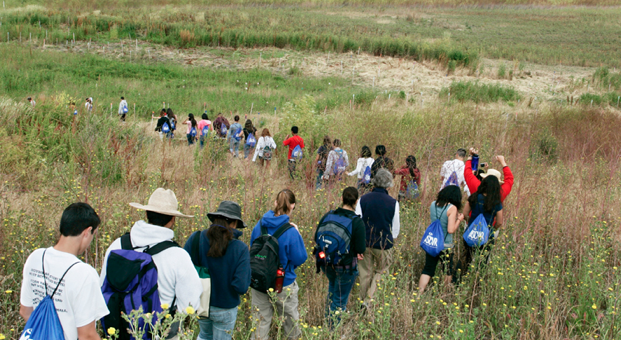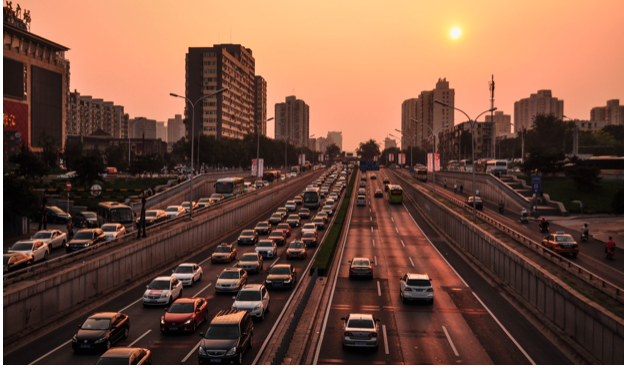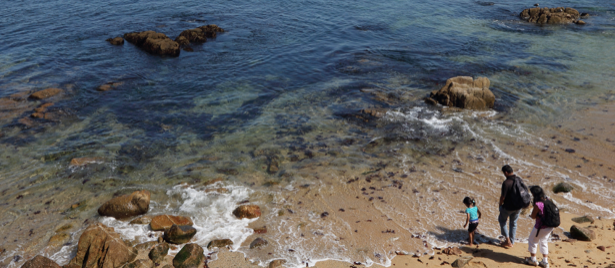Angling Toward Solutions in Climate Change Education

Our global community is confronting a significant opportunity to change. We understand that protecting what matters to our families: our health and security, special places we care about, and living creatures with whom we share this planet (people and non-human species alike) depends on our collective efforts. Specifically, we need to change our systems that rely on burning fuels.
Many of us understand the basics of global climate change, but it’s worth reminding ourselves because evidence suggests that most Americans (and many people from other parts of the world) don’t readily call to mind the underlying mechanisms which cause it. Essentially it all starts with the process of burning fossil fuels. Since the 1700s, humanity has developed immense systems that depend upon burning coal, oil and natural gas for energy. Our global transportation, including ocean shipping, automobiles, railways and air travel rely almost entirely on burning oil or gas. Manufacturing is similar, as are the systems which support agriculture, in endeavoring to distribute food to 7 billion people around the globe. These systems all depend on energy from burning coal, oil, and natural gas, which releases carbon dioxide into the atmosphere.

Thus, collectively, our human systems are causing enormous amounts of carbon dioxide to be released into the atmosphere. That vast amount of carbon dioxide acts like a blanket around the Earth, trapping heat that would otherwise escape into space. The trapped heat is slowly accumulating, warming the lower atmosphere (where we live) and the ocean. Negative consequences emerging from all that heat include that oceans are slowly expanding as they get warmer. That’s one of the primary causes of sea level rise which threatens coastal cities and habitats in many places around the world. The problem is one of systems. So too then must be our thinking about how to go about coming up with solutions.
Change is needed. And this change presents in two concrete forms of action. One is to dramatically increase efficiency, so our systems can provide their services with much less energy and therefore require much less fuel. The second involves switching from fossil energy to other sources of energy that don’t require burning anything. Innovations to solar energy, wind, geothermal, small hydropower, tidal power and wave power are all currently being developed. Changes are as feasible as they are necessary. We know that when it comes to changing systems many players are necessary, we also know that everyone has their role to play.

As Educators, we have a role to play in helping people understand that it’s possible and that every person can find ways to participate. Specifically, we are called upon to share what we know about what science is telling us about the issues and how best to address them. One of the most important changes we need to continue to make is to help shift attention exclusively toward systemic change. And as educators, we are well-equipped to do that!
It’s important to keep talking about systemic changes we can all help to facilitate. These ideas are explained more thoroughly in the article attached to this post, “Angling Toward Solutions in Climate Change Education,” please read it and share and discuss it with other Educators.
* Thanks to the Informal Learning Review, a publication of Informal Learning Experiences, for permission to share the article which originally appeared in issue No. 136 Jan/Feb. 2016.
More Blog Posts
 Friendly neighborhood climate scientistFriendly neighborhood climate scientist by Jeremy Owens, March 23 2020 Have you ever wanted or even needed a climate science question answered but couldn’t find an answer and you wanted to speak with a scientist? Have you wanted to work with a scientist to do outreach but didn’t know how to contact someone? If you have ever had a need but felt [READ MORE]
Friendly neighborhood climate scientistFriendly neighborhood climate scientist by Jeremy Owens, March 23 2020 Have you ever wanted or even needed a climate science question answered but couldn’t find an answer and you wanted to speak with a scientist? Have you wanted to work with a scientist to do outreach but didn’t know how to contact someone? If you have ever had a need but felt [READ MORE] Climate Emotions: Helpless Or Hopeful?Climate Emotions: Helpless Or Hopeful? by Heidi Zamzow, April 17 2019 With the recent IPCC warning that we may have perhaps a dozen years before we encounter severe and irreversible impacts of climate change, it comes as little surprise that a recent survey* in climate communications research indicates 7 in 10 people in the U.S. are concerned [READ MORE]
Climate Emotions: Helpless Or Hopeful?Climate Emotions: Helpless Or Hopeful? by Heidi Zamzow, April 17 2019 With the recent IPCC warning that we may have perhaps a dozen years before we encounter severe and irreversible impacts of climate change, it comes as little surprise that a recent survey* in climate communications research indicates 7 in 10 people in the U.S. are concerned [READ MORE] Global Climate Action Summit RecapGlobal Climate Action Summit Recap by Allison Arteaga, September 20 2018 One week ago, leaders from around the world gathered in San Francisco for the Global Climate Action Summit. The event celebrated ongoing efforts to curb fossil fuel emissions, while also calling for more ambitious action to meet the targets set forth by the Paris Agreement. [READ MORE]
Global Climate Action Summit RecapGlobal Climate Action Summit Recap by Allison Arteaga, September 20 2018 One week ago, leaders from around the world gathered in San Francisco for the Global Climate Action Summit. The event celebrated ongoing efforts to curb fossil fuel emissions, while also calling for more ambitious action to meet the targets set forth by the Paris Agreement. [READ MORE] Communicating in the Swamp: How to Navigate Public Thinking About Climate and Ocean ChangeCommunicating in the Swamp: How to Navigate Public Thinking About Climate and Ocean Change July 22 2016 This is the first in a series about framing ocean and climate change. When people think about oceans this summer, they might think of a good vacation spot—a place to spread out the beach towel, pop up the umbrella, and relax under the sun as [READ MORE]
Communicating in the Swamp: How to Navigate Public Thinking About Climate and Ocean ChangeCommunicating in the Swamp: How to Navigate Public Thinking About Climate and Ocean Change July 22 2016 This is the first in a series about framing ocean and climate change. When people think about oceans this summer, they might think of a good vacation spot—a place to spread out the beach towel, pop up the umbrella, and relax under the sun as [READ MORE] Metaphors Can Counter Misinformation about Climate ChangeMetaphors Can Counter Misinformation about Climate Change December 02 2016 This is the fifth post in a series about framing ocean and climate change. Our ability to communicate the science of climate change to the public is as important as ever. The outcome of the recent presidential and congressional elections and the state of public discourse [READ MORE]
Metaphors Can Counter Misinformation about Climate ChangeMetaphors Can Counter Misinformation about Climate Change December 02 2016 This is the fifth post in a series about framing ocean and climate change. Our ability to communicate the science of climate change to the public is as important as ever. The outcome of the recent presidential and congressional elections and the state of public discourse [READ MORE]